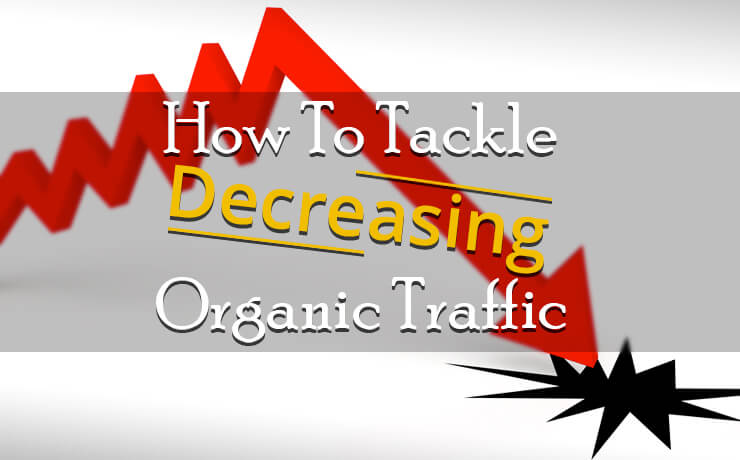How To Tackle Decreasing Organic Traffic

Chad Faith
Director of Content

When you run an SEO campaign, you should ideally be getting an ongoing and steady increase in organic traffic. Organic traffic refers to the number of visitors that lands on your website after those individuals find it through a keyword search on search engines. However, we do not live in a perfect world, and at one point or another, you may reach a point where your organic traffic levels start to flatline or drop. Sometimes, a decrease of traffic is temporary. For some sites, they may experience an active decline, i.e. a dip in organic traffic lasting for over a few weeks. If this is happening to you, it is time to troubleshoot the problem to see what is going on.
Perform Thorough Audit on Your Site Content
In some cases, the cause of decreased organic traffic could be affected by the quality of your on-site content. For instance, you may have accidentally removed some top-performing content. A major amendment like this can decrease the overall value of your site. If you have recently published too much content, or decreased your content budget, or not enough people are reading or sharing your content, these things could also cause a similar drop. If you are not sure what the cause is, it is recommended that you conduct an on-site content audit. Some of the tools you can use for the job include Google Analytics, Google Search Console, SEMRush, and more.
Tweak Your Link Profile
An unexpected change in your link profile could have a direct impact on how well your site links rank in organic search results. If you are not sure whether you have poor links pointing to your site or not, consider using a link-profiler to analyze those links. You will be able to determine the possible trigger points that account for a drop in search visibility with greater clarity.
In some cases, you may find new links coming from spammy sources. Links from dubious websites affect your site’s trustworthiness to search engines. If this is the case, you should remove them by contacting the webmaster or ask Google to disavow the link if the former option fails. The next step is to look for other opportunities to build new and stronger links to boost your site authority and link profile.
Observe What Your Competitors are Doing
When you think your organic traffic is decreasing, you may want to look at your competition to see how they have evolved in the past few months. This is a practice you should remember if you manage a startup in new industries or you are running a company that is trying to thrive in competitive landscapes. Start by examining your search positions for various keywords. You may find that your competitors have invested more in their own SEO campaigns and outperformed you in the process. If this is true, you can target different and more specific terms or invest in more head-to-head competition (if you have the budget to do so). In most cases, you should be focusing on studying your performance in areas of on-site content and link-building.
Fix and Improve
When it comes to correcting decreasing traffic issues, there are no immediate fixes – sorry. However, you should continue removing bad links, build new reliable ones, or even consider SEO consultation. Oftentimes, these measures are enough to correct the problem. Next, you should know that it may take a few weeks or months for Google’s search index to reflect your changes. As long as you stay committed to employing best practices and learn from all the mistakes you have made along the way, you have good chances of getting back on track with gaining positive organic traffic growth.
 Free
Consultation
Free
Consultation Free
Google Ads Audit
Free
Google Ads Audit







